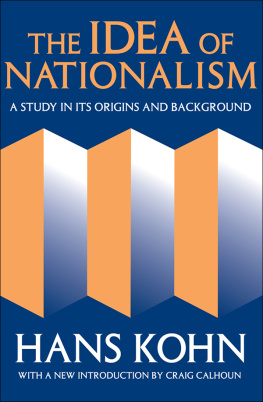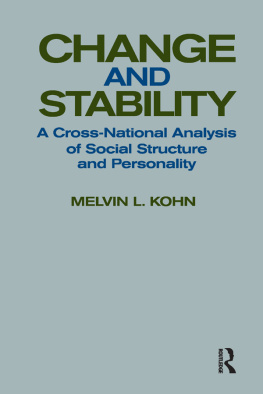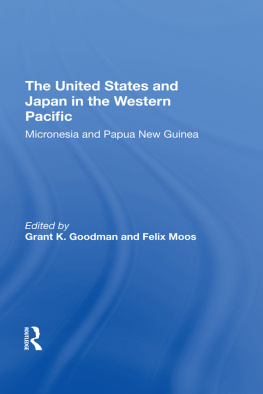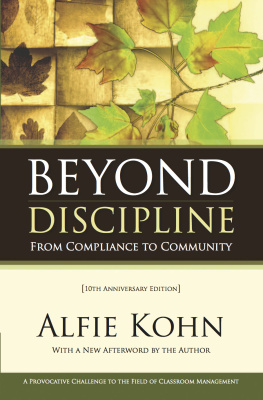ROUTLEDGE LIBRARY EDITIONS:
GERMAN HISTORY
Volume 28
GERMAN HISTORY
GERMAN HISTORY
Some New German Views
Edited by
HANS KOHN
First published in English in 1954 by George Allen & Unwin Ltd.
This edition first published in 2020
by Routledge
52 Vanderbilt Avenue, New York, NY 10017
and by Routledge
2 Park Square, Milton Park, Abingdon, Oxon OX14 4RN
Routledge is an imprint of the Taylor & Francis Group, an informa business
1954 Hans Kohn
All rights reserved. No part of this book may be reprinted or reproduced or utilised in any form or by any electronic, mechanical, or other means, now known or hereafter invented, including photocopying and recording, or in any information storage or retrieval system, without permission in writing from the publishers.
Trademark notice: Product or corporate names may be trademarks or registered trademarks, and are used only for identification and explanation without intent to infringe.
British Library Cataloguing in Publication Data
A catalogue record for this book is available from the British Library
ISBN: 978-0-367-02813-8 (Set)
ISBN: 978-0-429-27806-8 (Set) (ebk)
ISBN: 978-0-367-24664-8 (Volume 28) (hbk)
ISBN: 978-0-429-28377-2 (Volume 28) (ebk)
Publishers Note
The publisher has gone to great lengths to ensure the quality of this reprint but points out that some imperfections in the original copies may be apparent.
Disclaimer
The publisher has made every effort to trace copyright holders and would welcome correspondence from those they have been unable to trace.
GERMAN HISTORY
SOME NEW GERMAN VIEWS
Edited by Hans Kohn
First published in 1954
This book is copyright under the Berne Convention. Apart
from any fair dealing for the purposes of private study, research,
criticism or review, as permitted under the Copyright
Act 1911, no portion may be reproduced by any process without
written permission. Inquiry should be made to the
publisher.
Printed in Great Britain
in 11 point Garamond type
by Jarrold and Sons Ltd
Norwich
To the Memory of
Sam A. Lewisohn
The German texts were translated
by Dr. Herbert H. Rowen
This book owes its origin to the two visits which I paid to Germany in the spring of 1951 and 1952. A paper which I read before the annual meeting of the American Historical Association in New York on December 29, 1951, forms the substance of the first chapter of the present book. Professor Karl W. Deutsch of the Massachusetts Institute of Technology, who heard the paper, encouraged me to enlarge it and to document it in the present book. I am grateful to Dr. Herbert H. Rowen for having undertaken the translation of the German texts. Anybody who has tried to render German writings in the Geisteswissenschaften into English will appreciate the difficulties of Dr. Rowens task.
Ten German scholars are represented in this book with essays or studies written since 1945. They range in age from ninety, the venerable age reached by Meinecke, who was born before Bismarck created the Second German Empire, to his biographer Hofer, who grew up in the shadow of the Third Reich. Eight of the historians represented are German in every sense of the word. Two do not fit this description: Professor Holborn was born and educated in Germany but is now an American historian; Dr. Hofer is Swiss but has been teaching for several years at the Free University in Berlin, where he is a member of the Friedrich Meinecke Institute. Though these two are partly outsiders, their views will be found helpful in elucidating the various aspects of a complex and troubling problem.
The bibliography at the end of the volume supplements that given in the notes to Chapter One. Miss Anne Marie Reinold, assistant in the Friedrich Meinecke Institute of the Free University of Berlin, has helped in compiling this selected bibliography for which all students who wish further to pursue the discussion going on among historians in Germany today, will be greatly indebted to her.
Footnotes by the authors of the various chapters are numbered. Asterisked footnotes are by the editor for the purpose of identifying for the English-speaking student some of the less familiar names. In some of the essays a few unessential abridgements were made in the translation.
Finally, I have to thank Miss Janet Schuck for the extremely pleasant and careful manner in which she helped to prepare this manuscript for the printer.
H. K.
Cambridge, Mass.
Summer, 1952
CONTENTS
I
Less than ten years have elapsed since the total breakdown of German national and political life in the greatest defeat which any modern power has ever suffered. In this short time the country has experienced, with Western help, an astonishing restoration of all aspects of her national and economic existence. The German Federal Republic will soon regain equality and sovereignty as a result of the contractual arrangements which she concluded with the United States, Great Britain and France. A German army will be recreated, though in the.framework of a European Defence Community. The course which German and European history will take from this point on is uncertain. Thus, it might be appropriate to consider some of the forces influencing the likely further course of German development.
In modern Germany scholars, and above all historians, have always played a great role, indicating the changes in national temper and directing public opinion. Certainly, the future of Germany is being not only, and even not mainly, influenced by her historians; nevertheless, past experience reveals the symptomatic value of a study of trends in German historiography and intellectual life as a guide for gauging the nascent and dominant currents which shape and sway the peoples mind. German intellectuals and scholars have carried a great share of responsibility for the anti-democratic and anti-Western attitudes of the German people in the last one hundred and fifty years. Will they now be more helpful in integrating Germany into the democratic community of the West?
Democracy is not a product of legislation or constitutions. If it were, the problem would be simple. Except for the important fact that the election of the parliament was based upon proportionate representation and party-lists of candidates putting their choice into the hands of the central party committees, the constitution of the Weimar Republic was a good constitution. It failed to prevail because it was not rooted in the way of life and the traditions of the people. It was rejected by many of them as an importation from the West and therefore as unsuitable for the German mind and conditions. The deep anti-Western feeling of the Germans was a poor soil for allowing democracy to take root. In recent times democratization has become even more difficult by the fact that lately the government has been assuming more and more vital tasks for everyday life which were formerly left to private initiative and private organization. For that reason, too, it may be salutary that Germany after 1945 was organized on a federal basis with as little centralization as possible, allowing a large measure of autonomy and responsibility to the various states and communities, where individual participation is much easier and where not everything is left to a distant and aloof bureaucracy. The future of Germany will largely depend on whether the Germans will retain and expand this federalization or whether they will turn, as the Weimar Republic unfortunately did, to an ever-increasing centralization under the name of unity and the guise of efficiency.















